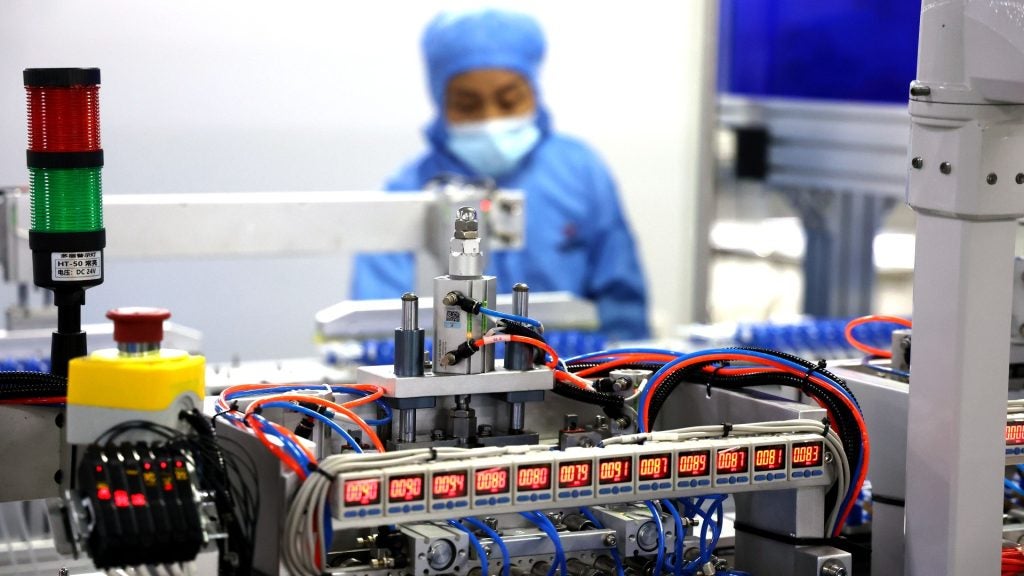China, known for its intense surveillance of citizens, may be able to leverage the data it collects to advance its medical devices industry, a new GlobalData report reveals.
China’s medical device market is already large, making up 25% of the market value in Asia-Pacific and 8.3% of the global total, and it is set to get larger, growing at a compound annual growth rate (CAGR) of 5.6% between 2023 and 2025.
Despite this, the country currently imports 80% of its high-end medical devices, according to GlobalData's Impact of China on Medical Devices Industry report. Domestic manufacturers tend to focus on class I devices, which have the lowest level of risk and complexity, meaning China is largely dependent on foreign powers with high prices for their most advanced medical procedures. The ruling Chinese Communist Party (CCP) wants to change this.
In 2015, the government released its Made in China 2025 plan, with the aim of increasing China’s domestic content of core components and materials to 40% by 2020 and 70% by 2025 across all industries. In high-tier medical devices China aims for 50% by 2020, 70% by 2025 and 95% by 2030.
Part of this programme will involve utilising the vast swathes of data that the government and local health offices hold on citizens. Since 2016, academics have used integrated data sets to evaluate current and future clinical and economic burdens arising from chronic diseases, the most prevalent of which in China are chronic obstructive pulmonary disease, diabetes and cardiovascular disease.
GlobalData expects to see a greater usage of this information in future, keeping track of disease trends and feeding it into big data models to improve their accuracy.
The government is also using its surveillance to create an integrated precision medicine database, storing patient and population data alongside biological samples from studies and biobanks. The size and breadth of this data will support medical researchers in creating personalised medical interventions.
Alongside this, medical insurance companies including Ping An Health are using health data to gamify their offerings, offering points, rewards and discounts for those who live healthy lifestyles. The data in this case is collected from wearables, including smart watches and fitness trackers, if the patient agrees.
These are examples of a trade-off between privacy and quality of life that is increasingly common in China, according to Josh Chin and Liza Lin, authors of Surveillance State. In an interview with the MIT Technology Review last year, they explained that China is redefining its social contract, moving away from a model in which citizens give up political power in exchange for a high growth economy and towards a model in which personal data is given up in order to build a society structured around the people’s needs.
Data for healthcare
The government is already utilising this technology for medical purposes. An interviewee in the city of Hangzhou told Chin and Lin of an ambulance trip with his mother, who almost drowned. The city was able to track their progress and change traffic lights to give them the fastest route to the hospital.
China is far from the only country to aggregate medical data. The UK’s National Health Service has had a number of scandals about patient confidentiality breaches in recent years, the most recent of which involved a number of local trusts sharing information with Facebook without patients knowledge or consent.
Activity trackers firm Fitbit, owned by Google, also came under fire this year for opaque health data collection in the EU.
China's surveillance is undoubtedly intense, and runs the risk of misuse, as all mass data collection does. It is also questionable how much of a 'contract' the government really presents, given the lack of meaningful democracy in the country.
Providing a precis of the situation, GlobalData Medical Analyst and author of the report Cynthia Stinchcombe explains: "China's usage of mass surveillance to fuel their big data initiatives in the medical devices market has enabled the country to collect vast amounts of health-related data. This has contributed to innovation and efficiency within their healthcare system like faster drug discovery, clinical trial optimization and clinical decision support. However, it also raises important ethical and privacy concerns."
Nevertheless, it would be patronising to suggest that a country of over a billion people could be governed without some degree of consent, and the usage of this data in the medical field is a clear example of the benefits the CCP offers in exchange for compliance.









